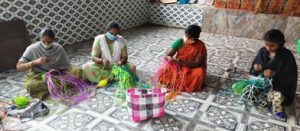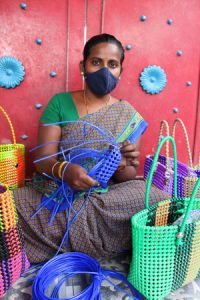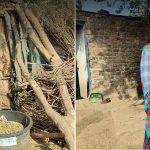WOMEN EMPOWERMENT
In the Rajeshwari slum area in Banashankari, Bengaluru resides an unstoppable force called Sushila, who she attended a two-day life skill training organised by CARE India in March 2021. This workshop helped her recognise her creative talents, which she decided to put to better use to earn an additional income. Motivated and enthused, Sushila set out to weave wire baskets. The CARE project team provided her with a few rolls of wire, enough to make two baskets to start with, and studied the feasibility of making these baskets and marketing them.
Unfortunately, the team realised that due to poor vision, Sushila was unable to weave the baskets as deftly as was needed. This setback did not stop the woman with an iron will. She pitched the idea of teaching her skill to other women from her community. This is how, eight women waste pickers, namely Suseela, Shivagami, Annapoorna, Mallika, Palaniyamma, Gayathri, Lakshmamma and Uma got the opportunity to learn how to weave baskets in their free time.
 CARE India supported them with raw materials during their learning process, during which there were no specific sizes set for the baskets. Gradually, as their skills sharpened and a strong potential for the business grew, the team helped the women prepare their products for the market by standardising them. The baskets were categorised as small (Length: 7”, Width: 8”), medium (Length: 10”, Width: 12”) and large (Length: 13”, Width: 14”). The baskets were made as per these specifications and sold at a fixed rate, leaving a comfortable profit margin for the makers.
CARE India supported them with raw materials during their learning process, during which there were no specific sizes set for the baskets. Gradually, as their skills sharpened and a strong potential for the business grew, the team helped the women prepare their products for the market by standardising them. The baskets were categorised as small (Length: 7”, Width: 8”), medium (Length: 10”, Width: 12”) and large (Length: 13”, Width: 14”). The baskets were made as per these specifications and sold at a fixed rate, leaving a comfortable profit margin for the makers.
The initial sales gave immense encouragement to the women, in addition to which, they began to receive orders at the same time. So far, this group of women have sold around 100 baskets. Now, they spend all their free time weaving baskets. They have big dreams and plans to register themselves as a business group and market their products on a larger scale, so that they can earn a stable income to support their families. “We have realised that if we work diligently, we can make this a successful business. All of us are dreaming big and working towards it,” shares Annapoorna.
Moreover, these women have completed their soft skill trainings provided by CARE India and have gained the knowledge, confidence and will power to make a living out of wire basket making.
 In the words of Shivagami, “Sushila’s idea of weaving wire baskets has given us an opportunity to spend our free time productively and earn an extra income that can support us in many ways.”
In the words of Shivagami, “Sushila’s idea of weaving wire baskets has given us an opportunity to spend our free time productively and earn an extra income that can support us in many ways.”
“Initially, it was not an organised set up, in terms of standardising the size of the product, pricing it uniformly and marketing, but now we are receiving guidance and support from the CARE India team. They are helping us organise our activities and plans,” says Gayathri.
About the Programme: In Bengaluru, the H&M Foundation (H&MF) has developed a funding Collective Impact (CI) initiative to bring improvements in the quality of life of waste pickers in the city, with a gendered and systemic approach. It has identified seven key intervention areas which addresses issues prioritised by waste pickers. CARE India has been entrusted to develop and devise livelihoods options other than waste picking, so that interested waste pickers have a secured and sustainable alternative livelihood option that contributes to an improved quality of life for them.
Posted by: Swagatika Das, PO-KMLE
Location: Rajeshwari Slum, Banashankari, Bengaluru
In 2022, for International Women’s Day (IWD), the UN has adopted the theme ‘Gender equality today for a sustainable tomorrow’, to celebrate the tremendous efforts by women and girls around the world in shaping a more equal future and recovery from the COVID-19 pandemic.





